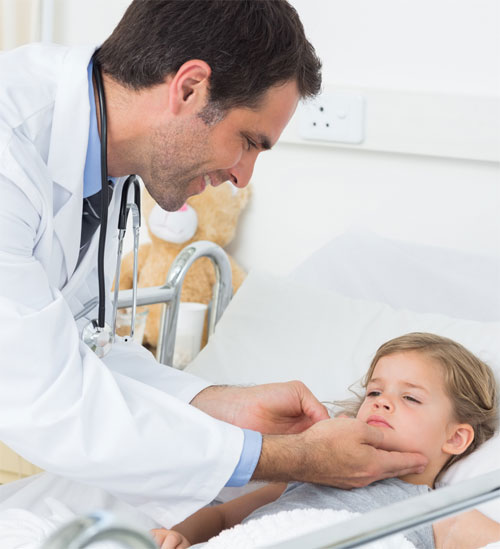Hypothyroidism is a condition in which the thyroid gland does not function as it should and therefore producing the insufficient amount of thyroid hormones. Hypothyroidism in children exhibits in a number of ways; congenital hypothyroidism or acquired hypothyroidism. Acquired hypothyroidism can either be autoimmune hypothyroidism or iatrogenic hypothyroidism.
[sc:Adsense468x60 ]
Congenital hypothyroidism develops when the thyroid does not develop well even before birth. It may be hereditary. Autoimmune hypothyroidism occurs when the immune system of child attacks the thyroid gland, a disorder known as chronic lymphocytic thyroiditis or CLT. This damages the thyroid gland leading to reduced function. The chances of CLT developing may be increased if the child has another autoimmune disorder especially diabetes. Hypothyroidism may also be caused when a mother is treated for thyroid disorder or even when maternal antibodies produced attack the mother’s thyroid.
Iatrogenic hypothyroidism occurs when the thyroid gland is damaged or removed through surgery. This then means the body will not produce the thyroid hormone.
When hypothyroidism occurs in children it affects the overall growth and healthy development of a child.
Symptoms include:
- Stunted bone development
- Constipation
- A poor appetite
- Jaundice
- Hoarse cry
- Delayed dental development in children
- Stunted growth in children
- Late puberty and slow growth in adolescent
- Slowed speech
- Fatigue
- Swollen face, droopy eyelids and hair loss
- Dry skin
- Obesity
 Hypothyroidism in children may be diagnosed during screening of the newborn. During this test, when very high levels of Thyroid stimulating hormone or low levels of T4 are shown, it usually means thyroid problems.
Hypothyroidism in children may be diagnosed during screening of the newborn. During this test, when very high levels of Thyroid stimulating hormone or low levels of T4 are shown, it usually means thyroid problems.
Autoimmune hypothyroidism or Hashimoto’s thyroiditis is the most common type of hypothyroidism in children. The thyroid gland is attacked by the body’s own immune system resulting in reduced function. This condition may come about at any age. In most cases, this condition may be overlooked since symptoms occur very slowly. Mental and physical changes will start to arise as the thyroid gland begins to fail with time.
A sudden change in a growth rate is always the first sign of hypothyroidism in children. This is usually accompanied by a delay in the skeletal development of the child. Another obvious sign of hypothyroidism in children is the swelling in the neck referred to as goitre. A decreased level of energy in your child and increased sensitivity to cold are also signs of hypothyroidism. When this condition is suspected, a blood test is carried out to determine the levels of thyroid stimulating hormone and the thyroid hormone.
[sc:Adsense336x280 ]
Hypothyroidism in children is however treatable. Pediatric endocrinologists specialize in treating children with hypothyroidism. Doctors will most likely prescribe thyroid replacement hormone. Levothyroxine, liotrix or liothyronine are mostly used. A periodic test is also required for monitoring purposes, to ascertain that the right levels are being maintained. It is especially important for children to be continuously monitored as they grow, for the doctors to adjust their medication.
In some rare cases, a child with hypothyroidism may require surgery. Surgery may be necessary when the thyroid gland becomes too big. It may also be necessary when medicine does not work or if it causes allergic reactions and unwanted side effects. Other reasons necessitating surgery may be the inability of a child to take radioactive iodine or if the child has benign thyroid nodules that are too large.































